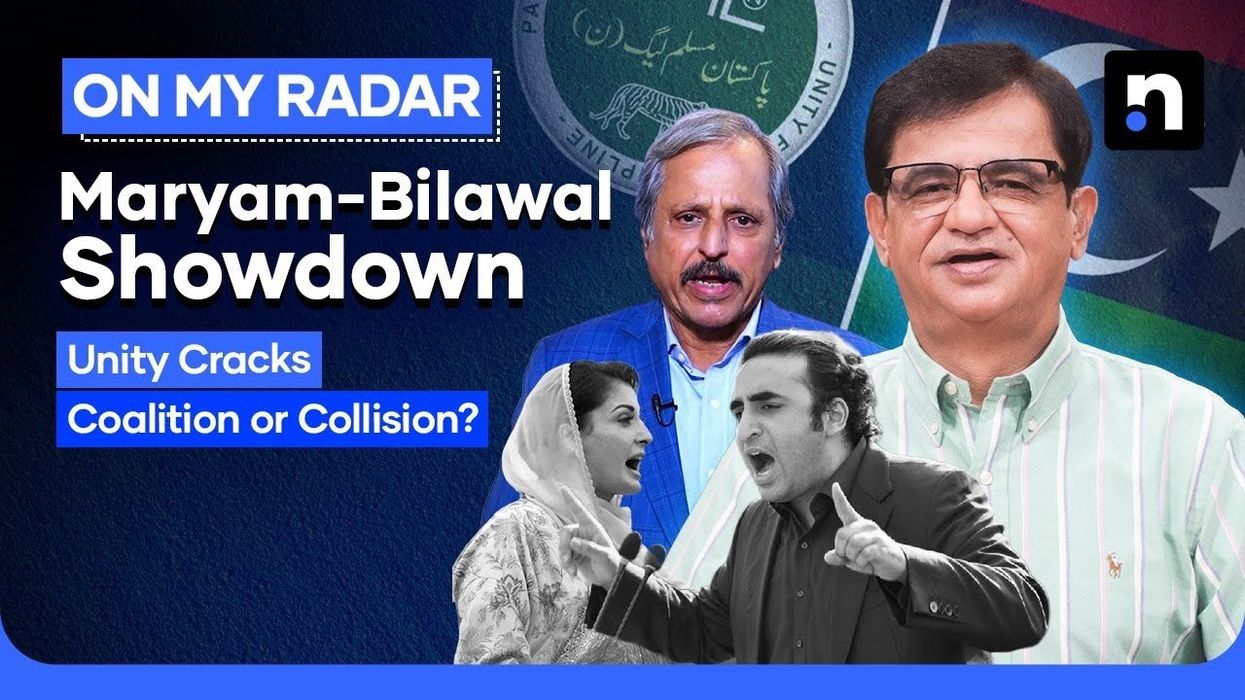PML-N, PPP alliance under strain as tensions flare between Maryam and Bilawal
Kamran Khan says the uneasy alliance between PML-N and PPP is unraveling as tensions rise between leaders
News Desk
The News Desk provides timely and factual coverage of national and international events, with an emphasis on accuracy and clarity.
Kamran Khan says the ongoing tension between the Pakistan Muslim League-Nawaz (PML-N) and the Pakistan Peoples Party (PPP) was “bound to happen,” comparing the uneasy coalition to “fire and water.”
He said the two rival parties, which joined hands for political expediency, now find themselves struggling to coexist as their alliance begins to fracture under mounting political and governance disputes.
“Just as fire and water cannot coexist, PML-N and PPP cannot remain together for long,” Khan said in his vlog, warning that the “pot of convenience” could soon break in public view.
Khan said the partnership between Prime Minister Shehbaz Sharif and President Asif Ali Zardari was born out of necessity after the ouster of former Prime Minister Imran Khan. Following what he described as the controversial February 2024 elections, Shehbaz took oath on March 4, while Zardari became president on March 10. Both parties projected unity in the early months of their new setup, despite a long history of rivalry.
In the 1990s, the political clash was between Nawaz Sharif and Benazir Bhutto. Today, Khan said, the new generation has taken center stage — Chief Minister Punjab Maryam Nawaz versus PPP Chairman Bilawal Bhutto-Zardari. The two have increasingly traded barbs over governance in Punjab and Sindh, with each questioning the other’s performance.
According to Khan, the growing hostility now threatens Shehbaz Sharif’s fragile government. PPP, while not part of the federal cabinet, remains vital to the coalition’s survival. In the National Assembly, PML-N holds 123 seats, PPP 74, MQM-P 22, PML-Q 5, and other allies including Istehkam-e-Pakistan Party 11 — totaling 235. If PPP withdraws support, the government would fall below the 169-seat majority threshold, leaving only 161.
Khan recalled that the first visible crack appeared in February when Maryam Nawaz inaugurated the Cholistan Canal Project in Punjab, attended by then–Army Chief Gen. Asim Munir, who later became Field Marshal following conflict with India in May. The PPP opposed the project, passing a resolution against new canals in the Sindh Assembly the following month.
While the issue briefly subsided during the tensions with India, the recent floods reignited disputes. Bilawal visited flood-affected areas in Punjab and mocked the provincial government’s relief efforts.
In a fiery response, Maryam Nawaz warned that “those who point fingers at Punjab will have their fingers broken.”
The feud escalated when Bakhtawar and Aseefa Bhutto-Zardari criticized the federal government’s handling of flood relief funds, demanding that aid be distributed through the Benazir Income Support Program (BISP). Bilawal echoed this demand, prompting Maryam to retort that “not everything can be cured by the BISP” and questioned why PPP wasn’t using its share of NFC funds for public welfare.
As the confrontation spilled into the parties’ second- and third-tier leaderships, both sides began attacking each other’s provincial governance. PPP called for local government elections in Punjab, while PML-N slammed the state of local bodies in Karachi and across Sindh.
Khan noted that while PPP has long relied on the “Sindh card” in politics, the PML-N is now playing the “Punjab card” in response. The tension has also reached parliament — PPP recently staged walkouts from both the National Assembly and Senate, demanding a public apology from the PML-N leadership.
Deputy Prime Minister and Foreign Minister Ishaq Dar managed to persuade PPP lawmakers back once, but the rift continues to widen. Khan cautioned that the situation resembles the 1990s when both parties worked to topple each other’s governments.
He stressed that at a time when Pakistan enjoys what he called “unprecedented global prestige and strong foreign policy under Field Marshal Asim Munir,” internal political stability remains crucial.
Khan revealed that before leaving for Malaysia, Prime Minister Shehbaz Sharif met his brother Nawaz Sharif in Jati Umra, asking him to help reconcile with the PPP. But, he added, there has been no meeting between Zardari and Nawaz since October 7, 2024.
“The key question now,” Khan concluded, “is whether Shehbaz Sharif can complete his five-year term amid this widening rift.”











Comments
See what people are discussing